|
RPCV, Dennis Halpin (K-16) shares his thoughts on the 50th of anniversary of President Kennedy's death. The views expressed are those of the author. 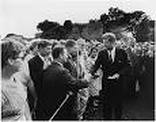 For every generation of Americans, there is a special day, a date when we indelibly remember exactly where we were when the horrific news came. For the Greatest Generation, it is December 7, 1941. For today's generation it is September 11, 2001. For my generation, it is November 22, 1963. I was in sophomore geometry class at Notre Dame High School for Boys in Niles, Illinois when the Holy Cross Father came on the loud speaker and said "the President has been shot in Dallas. Pray for him." You could then hear a pin drop in the classroom. Tears rolled down the cheeks of normally taciturn teenage boys. That Sunday, as we headed into Mass, a man called from the church parking lot "Oswald's been shot." A second shock. That week of the blood-stained dress, the Presidential oath on a grounded Air Force One, the rider-less black horse, the little boy saluting, and the eternal flame will be forever seared in our memories. For Irish-Americans this all has a very special place in our hearts for, as my Aunt Dot said, "Jack Kennedy was one of ours." I had almost personally seen President Kennedy in early November 1963, when our high school band headed to O’Hare Airport to greet him for his arrival for the Army-Air Force game at Soldier Field. We were told that a military coup in South Vietnam, however, led to a last-minute cancellation of what would have been his final visit to Chicago. There were other, later reports that the trip was cancelled due to an assassination plot on the streets of Chicago just three weeks before the President died. We have learned since his death that President Kennedy had his flaws, like all human beings. But he was still the leader of the glitter of Camelot, an era that seems so distant from today's grim America. His call to "ask not what your country can do for you, ask what you can do for your country," which has a somewhat naive ring in today's cynical world, struck a chord. You see, as with many of us, John Fitzgerald Kennedy changed my life. After graduating from college, I answered his call and volunteered with the Peace Corps to teach English in Korea. From there I joined the Foreign Service and had two tours in Korea, one at our Embassy in Seoul and the other at the Consulate in Pusan. I then served for a dozen years as an adviser on Korean and other Asian issues for Henry Hyde and other Congressional leaders on the House Foreign Affairs Committee. Today I am a visiting scholar at the U.S.-Korea Institute at SAIS. My entire career – and meeting my wife in Korea – was shaped by President Kennedy’s stirring words and by his formation of the Peace Corps. I recently returned to Seoul at the invitation of the Government of the Republic of Korea, to attend a Peace Corps reunion. Old volunteers there were overwhelmed by the thankfulness expressed. "We just taught ABCs and gave TB inoculations," I told the Korean press in an interview. But the Korean Vice Minister of Foreign Affairs told us all at a welcoming reception, that "you came and helped us in our time of need. Without Peace Corps, Korea would never have achieved its economic miracle." In 1991 South Korea established The Korea International Cooperation Agency (KOICA) to administer the grant programs that an economically developed Korea could now fund and to send volunteers, in a reflection of the Peace Corps, to the developing world. That also is part of President Kennedy's legacy. I was a bit disappointed to see two American Presidents, Obama and Clinton, along with Aunt Ethel, attending a wreath-laying ceremony at Arlington Cemetery for President Kennedy’s fiftieth death anniversary but that Caroline, the last surviving member of his immediate family, was absent. Caroline had flown off to Tokyo to become the new U.S. Ambassador just a week before the ceremony at Arlington. JFK’s daughter must have her own personal reasons. She also had meetings with the Japanese Emperor and Prime Minister. But, as President-elect Kennedy remarked on January 9, 1961: "to those whom much is given, much is expected." And it would be unimaginable for the Korean President, Park Geun-hye, also the daughter of an assassinated president, not to attend a memorial service for her father. I took the Metro out to Arlington Cemetery on Friday, November 22nd, to lay some flowers for President Kennedy from a grateful Peace Corps/Korea.
3 Comments
by Gerry Krzic (K-41; 1977-80) Autumn in the U.S., 2013 On an early autumn morning in Southeast Ohio, a Korea RPCV jogs while listening to 가울 편지 on his iphone; he double-checks the lyrics on Google. That same week, in North Carolina, another RPCV leaves her house to get the morning mail. She looks up to a clear blue sky through the barren tree branches. Her eyes begin to moisten as she remembers the “High Sky” autumn days of Korea. Seventeen hundred miles to the west in that same autumn, another Korea RPCV climbs a mountain in Arizona. Looking over the landscape, he recalls his days hiking Soraksan in Gangwando. Nostalgia on steroids? Or evidence of the transformative experience that Peace Corps Korea has been for the Americans who served there? I’d suggest the latter. Need more proof? How about... Autumn in Korea, 2013 Fifty-five Returned Peace Corps Volunteers (RPCVs), some with accompanying family members, are gathered in the lobby of Seoul's Somerset Palace Hotel on a mid-October Sunday afternoon. Guests of the Korea Foundation for the 8th Revisit Program to Korea, they are about to experience Korea one more time -- for a week full of emotion, reconnection, and remembrance... the lasting impact of the PC experience is in full view. The Revisit Week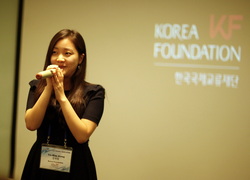 Sunday Night The week began with an evening orientation on Sunday -- reminiscent of the initial meeting the volunteers had experienced decades ago when they first arrived in Korea. if one tried hard enough, it was possible to step back in time and imagine that a new PC group was forming -- perhaps "K-2013." The American staff would be Jon Keeton and Jim Mayer, former KPC directors, and Nancy Kelly and Mary Broude, members of the Friends of Korea (FOK) board. This team would be ready to meet the needs of fifty-five personalities and accompanying family members. And if the American side should falter – the Korean staff, led by Yie-Rim Jeong, from the Korea Foundation, and Sunny Kim, of TN Korea Travel, would be there to save us. In short, our new PC “office” was ably staffed. We’d be okay for our new adventure. 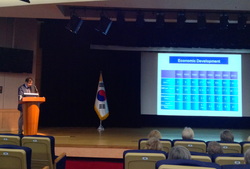 Monday After a fine breakfast buffet at the Somerset -- a daily ritual -- the group boarded busses to the Ministry of Foreign Affairs (MOFA) for presentations on the changes in Korean education and health practices since the 1960s. Led by Professors Ha and Sohn, we learned that the respect accorded teachers in Korea (evidenced by the high ranking of Korean teachers’ salaries in a world-wide study) and the emphasis on engineering education may have been two of the keys to Korea’s dramatic economic development. In health, we learned that the leading causes of death in the 1960s and 70s -- tuberculosis-- had been replaced by cardiovascular diseases in the 21st century. The time passed quickly as we continued asking questions – it was time to get ready for lunch and then on to our next visit: the Korea International Cooperation Agency (KOICA). 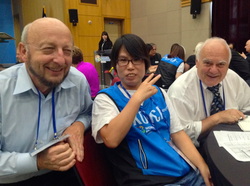 The visit to KOICA was like holding up a mirror -- but instead of seeing our own images, we now saw the faces of young Koreans about to embark on a journey that would likely transform their lives. The KOICA volunteers were being dispatched to a variety of countries– many of the them were preparing to go to South America. Their training included technical skills, cultural learning and Spanish. A member of our group began speaking Spanish to one of the KOICA volunteers. What a linguistic change from 35 years ago -- now Spanish and Korean served as the means of communication! As we left the meeting, we could only envy the KOICA volunteers' youth and enthusiasm. From what we saw, Mr. Sungho Choi, the Executive Director of the World Friends Headquarters, is sending a fine group of people out into the world. 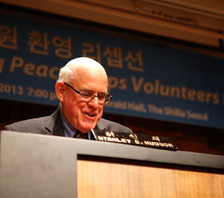 Monday night was a wonderful reception hosted by the MOFA at the Shilla Hotel. Graciously welcomed by the Korean Foreign Minister, we also had a chance to reconnect with the pride of PC Korea: Kathleen Stephens -- OUR Ambassador. RPCV Stan Hudson, behind an authoritative-looking Hangul nameplate, presented remarks on our behalf. Then, he and his wife, Ada, performed a lovely rendition of Arirang, adding a mellow touch to the evening's events. Many of the former Peace Corps staff officers and teachers were there. Who else remembers Korean teachers Park Sae Joon and Chun Bo Bae? 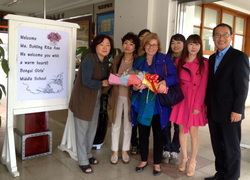 Tuesday & Wednesday Tuesday and Wednesdays were reserved for tours in Seoul or site visits to the RPCVs' schools and health clinics. “I remember, I remember” was the operative phrase for these days. Jim Mayer told many of the volunteers that they would likely have an emotional experience during this time and he was right! Although the buildings and staff may have changed, seeing former students and colleagues brought tears to the eyes of many of the RPCVs and their Korean friends. Check out the video (courtesy of the Korea Foundation) at the end of this blog and you'll understand. 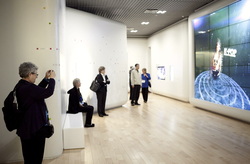 Thursday Thursday morning's highlight was the signing of the Memorandum of Understanding (MOU) between Friends of Korea (FOK) and the National Museum of Korean Contemporary History in Seoul. The museum highlights post-war Korean history and is a chance for RPCVs to share their intimate experience of Korea with the public. Museum Director, Mr. Kim Wang Sik, expressed his thanks for FOK's willingness to assemble objects for the collection. After the MOU signing and a rooftop lunch --with wonderful views of Seoul, the museum conducted oral interviews of each RPCV – another emotional moment for many. RPCVs who would like to contribute items to the collection should go to the Museum page on the FOK website for information on the process. 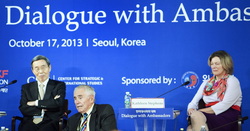 Thursday afternoon was a time of choice for the RPCVs. They had the option of attending a "Dialogue with Ambassadors," the House of Sharing (Comfort Women's Shelter), or Korean House for a traditional cultural experience. All the options presented a different aspect of Korea. The Dialogue with Ambassadors featured 6 former U.S. ambassadors to Korea and 6 former Korean ambassadors to the U.S. in a roundtable discussion of U.S.-Korea relations. The House of Sharing allowed the RPCVs the opportunity to hear from the remaining "Comfort Women" of World War II. The Korea House provided the RPCVs and family members the opportunity to learn the fine art of making kimchi and wearing the latest hanbok fashions. 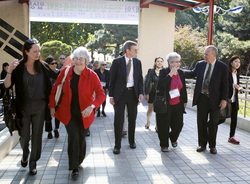 Friday Friday morning was a chance for the RPCVs to see firsthand some of the developments in Korea's education and health facilities. Former education volunteers visited the Hanguk Woojin Hakgyo, a school for students with special needs. Health volunteers visited the Korea Foundation for International Healthcare. Both groups were impressed by the facilities and the developments in Korean education and healthcare. 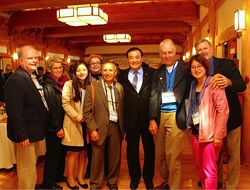 Friday afternoon was a visit to the Korean National Assembly. The RPCVs had a presentation about the Korean political system and then a delightful reception at Sarang Jae, the site of the 2010 G-20 summit in Seoul. Speaker of the National Assembly, H.E. Kang Chang-hee, was our host. Possessing a fine sense of humor, Speaker Kang made all of the volunteers feel warmly welcomed as he mingled and posed for pictures. Friday Evening -- Farewell Party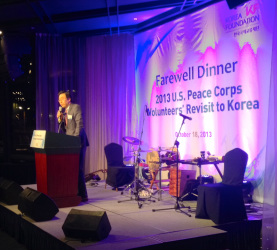 Friday evening, arrived too quickly -- it was time for the final event of the week -- a farewell dinner at the Seoul Marina Club House. The group was welcomed by the KF Director, Dr. Hyun-seok Yu. Jon Keeton and Jim Tielsch offered remarks on behalf of the RPCVs and presented Dr. Yoo with a Through Our Eyes Book. There was more time for tears as we watched Joonhee Lee's video of the Peace Corps experience. Even our Korean Foundation MC was overcome with emotion. Warning -- if you haven't seen Joonhee's video -- have some tissues ready! Following the video, the audience was entertained by Ms. Eunkyeong Ahn: Purity. Melding the classical sound of the Korean Piri with an acoustic guitar, bass and drum, Ahn's music is a unique fusion of the East and West. Their final piece was a beautiful rendition of Arirang: RPCV Reflections on the RevisitAfter we returned to the U.S., we asked a few RPCVs their impressions of the Revisit. Here are their thoughts... 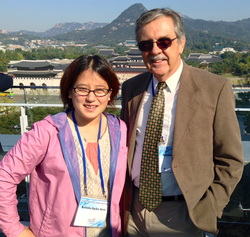 Russ Dynes (K-24; 1972-74) Russ was last in Korea about 40 years ago. The picture to the left features two Ohio State University grads from different generations-- Russ and Kristin Krzic, who was an accompanying family member of another volunteer. Looks like we need an O-H-I-O! "I served as a volunteer from July 1972 to July 1974 as a tuberculois control worker (K24) in a rural public health center in Cholla Buk Do, Korea. The staff at the health center: the young nurses, the workers and the senior administrators, treated me like family when I worked there as a young man. When I returned in October of 2013, although the personnel had changed and they were housed in a beautiful new health facility, they welcomed me like a "lost son" who had finally returned home." When asked about his career after PC, Russ replied, "I returned to the states after my PC work, I continued working in health and human services and recently retired from Delaware's Division of Public Health after 22 years. Peace Corp was a key part of my growth and development personally and professionally." 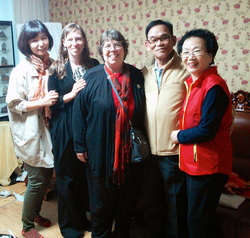 Peggy McLeod (K-19; 1971-73) On the left, Peggy and her daughter, Jasmin, pose with her PC Korean family during their revisit. "My overall feeling about the Korea revisit is that of honor and gratitude for the kindness and generosity of the Korean government and for their appreciation for what we did as Peace Corps volunteers. I have never felt so appreciated for work that I have done, and yet I know that I/we did not deserve this level of recognition. Most of us would agree that we received more than we gave as Peace Corps volunteers in Korea. I was moved by the visit to KOICA and consider this to be the real legacy that Peace Corps may have left in Korea. The heartfelt connection between the two organizations was touching, and I am proud to know that the examples we may have set during our volunteer service 35-40 years ago is being continued by Koreans themselves. My site visit was a warm, wonderful reconnection with my Korean family, the mother and father now in their late 70's, and the instant feeling of being “family” with them again. I never dreamed that I would see them again, and sit next to them and share food and gifts and memories. There were tears and hugs and “pogoshipoyos” all around! The welcome I received at my school was also warm and meaningful, with open hearts and typical Korean hospitality. My daughter and I were shown around the school and then were taken to a wonderful traditional bulgogi restaurant. We also visited a new park where part of my old school had been moved. I remembered our old school was very traditional in style, but what I didn't know was that part of the school was an ancient Chosun dynasty guest house, which is now part of a national historical monument. What a treat to see this beautiful old building now restored and remembered for its historical significance! My only other comment is that I would normally not have participated in a trip like this, being bused around in groups, sticking to a rigid schedule and having to be at galas and formal events. But I decided it was important for me to experience Korea again. My last trip in 2000 was more of a culture shock than a revisit, and I am so very glad I did. It was a once in a lifetime opportunity that I will never forget! Thank you to the Korea Foundation and Friends of Korea for the gift of reconnection with my beloved Korean home." 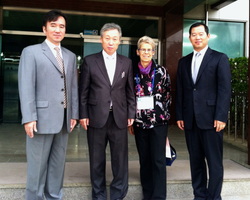 Audrey Pulis (K 29; 1973-75) On the left, Audrey at her school during the revisit. A later trek into the mountains led to a serendipitous experience and a new Korean friend. "The revisit for me was the first time I returned to Korea in 40 years, and it was a wonderful opportunity to see the advances Korea had made in that relatively short time , given the incredible advances in infrastructure, transportation, technology, etc. I was very grateful for the many activities we participated in over the six day program, and was quite touched by the level of gratitude expressed and demonstrated to us by the Koreans. I still feel I received far more from my Peace Corps experience than I gave to Korea. 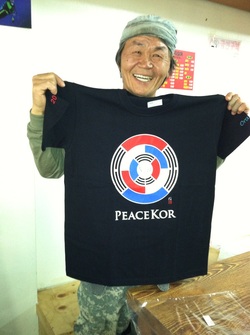 My site visit was as I expected: no one I had known or worked with was still there, and the school was changed as well from a coed middle school to a girl's high school. The school and town were not even recognizable from the poor rural agricultural community it had been 40 years earlier, as it is now the "Beverly Hills" of Seoul. However, I was treated very graciously by the school hosts. My most moving experience was when they (at my request) took me out to the walkway which led to the trail going up the mountain (Gwanaksan which I hiked often during my PCV days). A Korean gentleman/poet/woodcarver, came out when he saw us and insisted we go into his studio for coffee with him. They explained who I was and the purpose of my visit. He then presented me with one of his woodcarvings as well as a large vinyl hanging with one of his poems on it (it was about the beauty and serenity of the mountain). Then he asked me to come back and visit whenever I return. After the program ended, I went back there, hiked the mountain from Seoul National University side up and over the top and down to Gwacheon, found my new friend while having a meal at his wife's restaurant near the trail, and gave him one of the "Peace Kor" t-shirts I had ordered. He was thrilled, and I feel we will be friends forever. The entire revisit, in short, renewed my love for Korea and the Korean people, and I will go back within the next couple of years and tour more of the country that I was not able to see this trip." 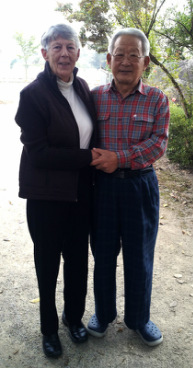 Terry Quarles (K14; 1970-72) On the left, Terry reconnecting with a colleague during her PC days. "To see the many structural and physical changes (road, transport, bridges, new and lovely buildings, art work, gardens and the trees, improved housing and farming techniques, folks just overall looking prosperous, more food and better food available) is so satisfying. People worked SO hard when I was there ('70-72)!!!!!! Also know these changes have brought about new challenges--care for the elderly, lots of education with no place to go after lots of money spent on education, the changes and challenges in the agricultural community, problems with "faster" and more expensive living costs . . . . . . . . .many still working many long hours for their "keep" . . . While the outside face has changed dramatically, folks in general have not changed all that much! (hurray!) The first formality, the kindness in general, the curiosity, the social mores and the overall social nature of the people has not changed much that I could see." 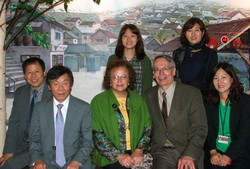 Paul Gregg (K-1; 1966-68) Paul and his wife Betty with old colleagues and new friends during his revisit to Incheon, his former site. "The revisit was wonderful, of course. My feelings of unworthiness did not prevent me from thoroughly enjoying being so well taken care of, the first-class accommodations, flattering receptions, the comraderie of the group, amazing cuisine, and the experiences of culture and information. After trying to imagine the changes for years, finally to see the Seoul and Incheon of today was fascinating. And I’m especially grateful that my wife, Betty, was made part of the group to experience all this along with me. The serendipitous developments of each day were a special delight. While we knew from Jon Keeton's emails and from the printed schedule that we were in for a great week, wonderful features that had not been detailed for us in advance would continue to materialize. For example, I had visualized the hike along the Seoul fortress wall to be us strung out in a quiet line that a couple of serious college fellows would be pulling along at a brisk pace. How much better to find myself accompanied by two middle school kids, delightful modern and perfect English speakers, as my personal companions for several hours? The site visit was an emotional experience! The principal of Jemulpo High School emailed me a couple of weeks before the revisit to introduce himself, welcome me, and tell me that he had been a student in the Middle School back when I was teaching there. When I arrived and approached the school door, he came running outside to greet me--alongside a teacher whom I recognized immediately and had liked very much but had never expected to see (he seemed older then, and turned out to now be 87). On the steps we were joined by six former students of mine—now distinguished and successful-looking men of about 60. Inside Betty and I were treated to a reception with flattering speeches and most generous gifts. I did get to see an English class during the visit, which I had hoped. And while I had hoped to see a little of the nearby city center, Principal Lee gave us a wide-ranging and thoughtfully-planned tour of greater Incheon, old and new, beyond all expectation. It was satisfying to see what hadn’t changed: the layout of school buildings in the little valley the school occupied, the same dirt playing and assembly field in front of the building, and of course the kindness, graciousness, and generosity of the people. Students in the gym stopped what they were doing and bowed to me when we went in. But of course in the city that now has one of the planet’s highest-rated international airports and several huge international seaport areas, modernization has transformed pretty much all but some hills into a different world. I chuckled when I realized that much of the Korea I remembered had been relegated to a museum we visited, and that there it was I, and not the much younger docent, who seemed the expert on A-frames, yan-ton (the charcoal blocks burned for heating), tabangs, and honey-bucket men." Betty also commented "As an accompanying spouse it moved me to be so well received at the visiting site with wonderful gifts to both of us, not just Paul. The site visit included a museum that preserves the lifestyle Paul experienced as a Peace Corps Volunteer. It was a slow revelation but very evident that the Koreans are a warm, appreciative people who are giving back through their own Peace Corps and gestures of appreciation" Paul concludes: "I’m enjoying telling people about the trip and about Korea today. I’m proud to wear my new Jemulpo Alumni Association belt." A Heartfelt Thank You: 진심으로 감사합니다! FOK, the RPCVs, family and friends who participated on the 8th Revisit would like to thank the Korea Foundation and all the Korean hosts who worked so hard to make this such a memorable trip. We valued reconnecting with old friends, remembering old places, and making new friendships -- which may mean Korea hasn't see the last of us! 진심으로 감사합니다! 또 뵙겠습니다! Finally...Here's the Korea Foundation video showing the week's events -- a must watch! Don't forget to leave comments! |
Details
Friends of Korea
This is a BLOG for and about Friends of Korea. Archives
May 2019
Categories |
2021 L Street, NW
|
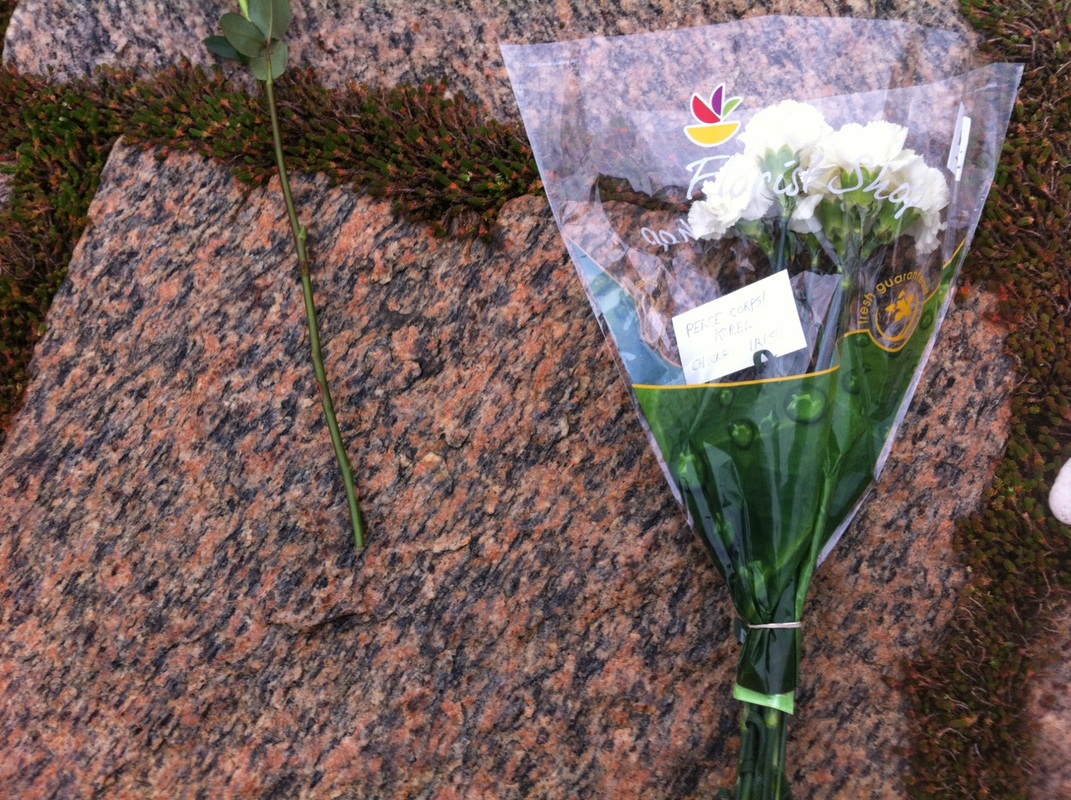
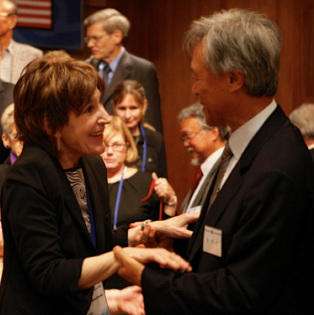
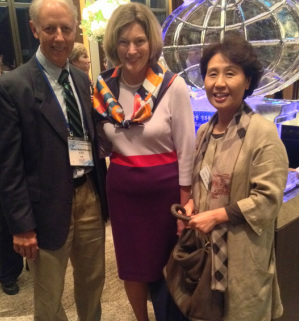
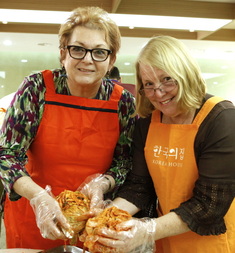
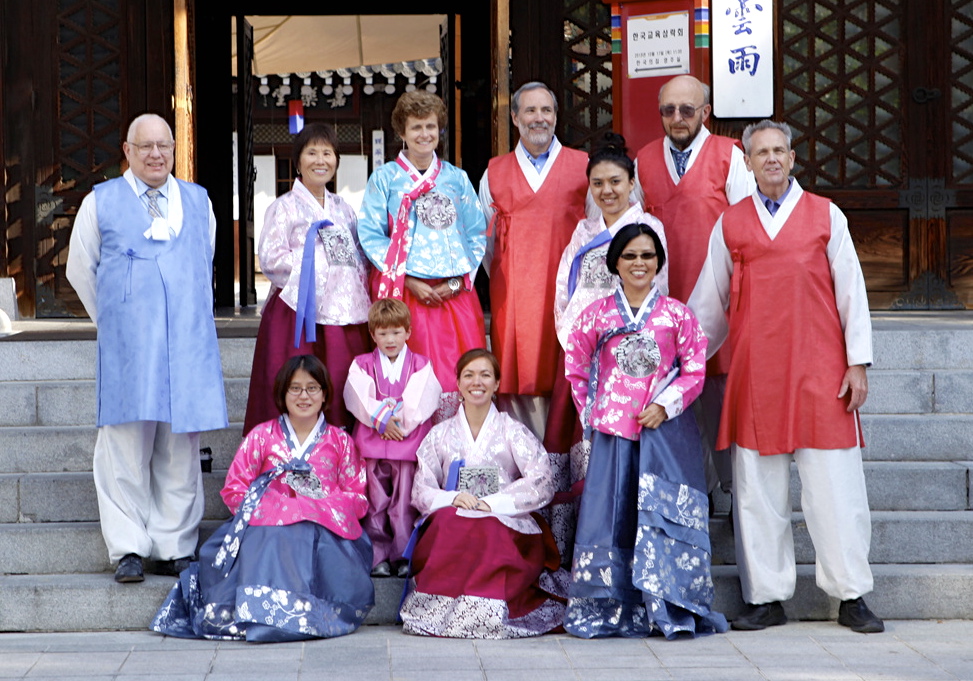
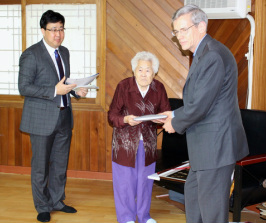
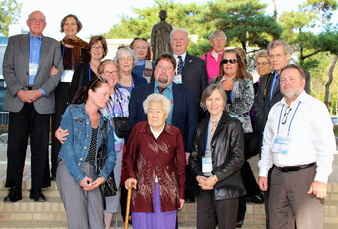
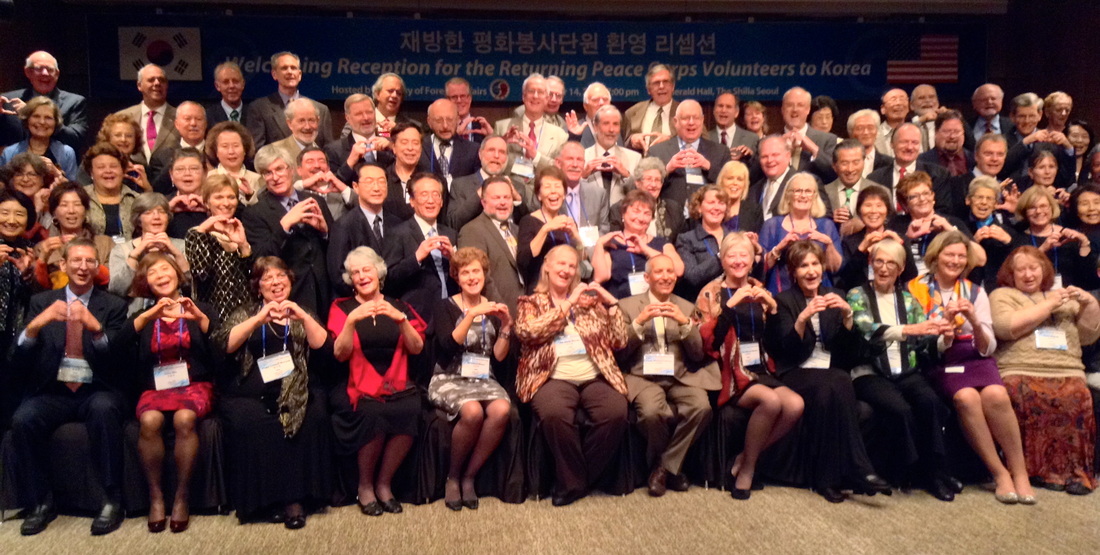

 RSS Feed
RSS Feed

